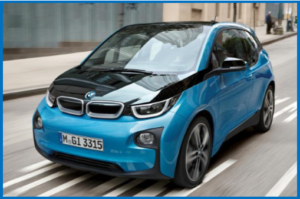
It bodes badly for the Detroit Three that China, the world’s largest market, and India, soon to surpass North America as the world’s second largest market, have both embraced EVs as the future.
BMW Group sales of electrified vehicles – hybrid and pure EVs – in the first three quarters of 2017 exceeded those of all of 2016. During September, electrified sales topped the 10,000 point for the first time in a single month. With the company’s electrified line-up totaling nine models, a sum of 10,786 (+50.5%) BMW i, BMW iPerformance and MINI Electric vehicles were delivered in September. This brings the year-to-date total to 68,687 (+64.2%).
The results show that GM and Ford Motor are lagging badly on the EV racetrack. FCA isn’t even out of the paddock.
Ironically, it is the power of government regulation of European expertise – making tax-subsidized dirty diesel engines – combined with the ongoing and seemingly endless civil and criminal liability of the VW Group Diesel Fraud case that gave the European policymakers strong incentives to put the pedal to the metal spurring EV development and sales.
Starting in 2021, the average new car in the EU will have an emissions cap of 95g of CO2 per kilometer. In other regions – notably the U.S. and China – diesel vehicles – also by regulation – will have to become much more efficient than they are now during the next few years.
France claims it will allow French cities to ban diesel cars entirely. That is right, the home of Peugeot and Renault, expert in diesel vehicles, is facilitating and hastening the death of diesels.
On the other side of the Channel, an environmental law pressure group, ClientEarth, successfully sued the British government after a five-year battle because 16 cities exceed the healthy limits of nitrogen dioxides produced by diesel engines during 2015. The UK has repeatedly failed to meet air quality standards for decades. The British government several years ago received an extension on meeting the latest EU standard, but now Britain’s highest court ruled the Government must draw up plans to eliminate illegal levels of nitrogen dioxide.
It bodes badly for the Detroit Three that China the world’s largest vehicle market and India – soon to surpass North America as the world’s second largest market – have both embraced EVs as the future.
“We are pleased to see the ongoing, strong sales development of our unrivalled range of electrified vehicles, with independent reports confirming our leadership in the field of electromobility,” claimed Dr Ian Robertson, BMW AG Management Board Member for Sales and Brand at BMW. “The BMW Group has the largest share of the electrified market worldwide; this year, we’ve already sold more electrified vehicles than in the whole of last year and we are well on track to deliver our target of 100,000 by year-end. The continued significant sales growth of these vehicles is due in part to the increasing availability of the BMW 5 Series plug-in hybrid, which in some markets accounts for up to a third of BMW 5 Series sedan sales,” he continued.
(BMW 530e: fuel consumption combined: 1.9-2.1 l/100 km; combined electricity consumption: 13.1-14.1 kWh/100 km, CO2 emissions combined: 44-49 g/km. Fuel consumption and CO2 figures were calculated as per the EU test cycle and may vary depending on the tires.)
September also saw growth in overall BMW Group sales. Despite the current changeover of the significant BMW X3 model, deliveries in the month totaled 239,764 (+0.8%) worldwide, bringing the year-to-date total to 1,811,234 (+3.7%). Both figures represent best-ever sales for the respective period.
Global BMW brand sales in the first three quarters of 2017 increased by 3.9% with a total of 1,537,497 customer deliveries worldwide. These record figures can be attributed to increased sales across a variety of models in the portfolio. The BMW X family of crossover SUVs continues to supply growth, despite availability of the BMW X3 being significantly affected by the current model changeover. Total BMW X sales were up 12.5% (522,360) in the first nine months of the year. Other models contributing significantly to sales growth this year include the BMW 1 Series (143,018 / +10.8%) and the BMW 7 Series (47,880 / +14.7%). Meanwhile in September, the new BMW 5 Series achieved sales growth of 48.8% (23,737) in markets excluding China, where the 5 Series is currently in model changeover.
The first nine months of the year also saw MINI achieve new record sales: worldwide, a total of 271,394 were delivered to customers, an increase of 2.8%. “MINI continues to achieve sustainable sales growth with the new MINI Countryman proving a particularly strong growth driver,” commented Peter Schwarzenbauer, BMW AG Management Board member for MINI, Rolls-Royce and BMW Motorrad. “The popularity of the first ever MINI plug-in hybrid, which has already been delivered to more than 2,700 customers worldwide since it was introduced in June, is particularly exciting,” he continued. Almost one in ten Countryman sold in September was a MINI Cooper S E Countryman ALL4 (fuel consumption in the EU test cycle: 2.3-2.1 liters/100 km, electricity consumption 14 kWh/100 km, CO2 emissions: 52-49 g/km).
The Goodwood-based Rolls-Royce brand delivered 2,343 (-10.7%) cars to customers in the first three quarters of the year. This result considers the current absence of Phantom from the market, pending first customer deliveries of New Phantom in January 2018, and, of course, challenging market conditions within the global luxury sector in several regions around the world. Significant rebalancing of the company’s manufacturing plant in preparation for new models is underway. The new Phantom was unveiled in July in London is claimed to have a “strong order book.”
BMW Motorrad once again achieved record sales in September, with 14,090 motorbikes and maxi-scooters delivered to customers. This was an increase of 15.3% compared to the previous year. In the first nine months of the year, 127,818 units were delivered to customers – an increase of 10.1% compared to the same period last year.

